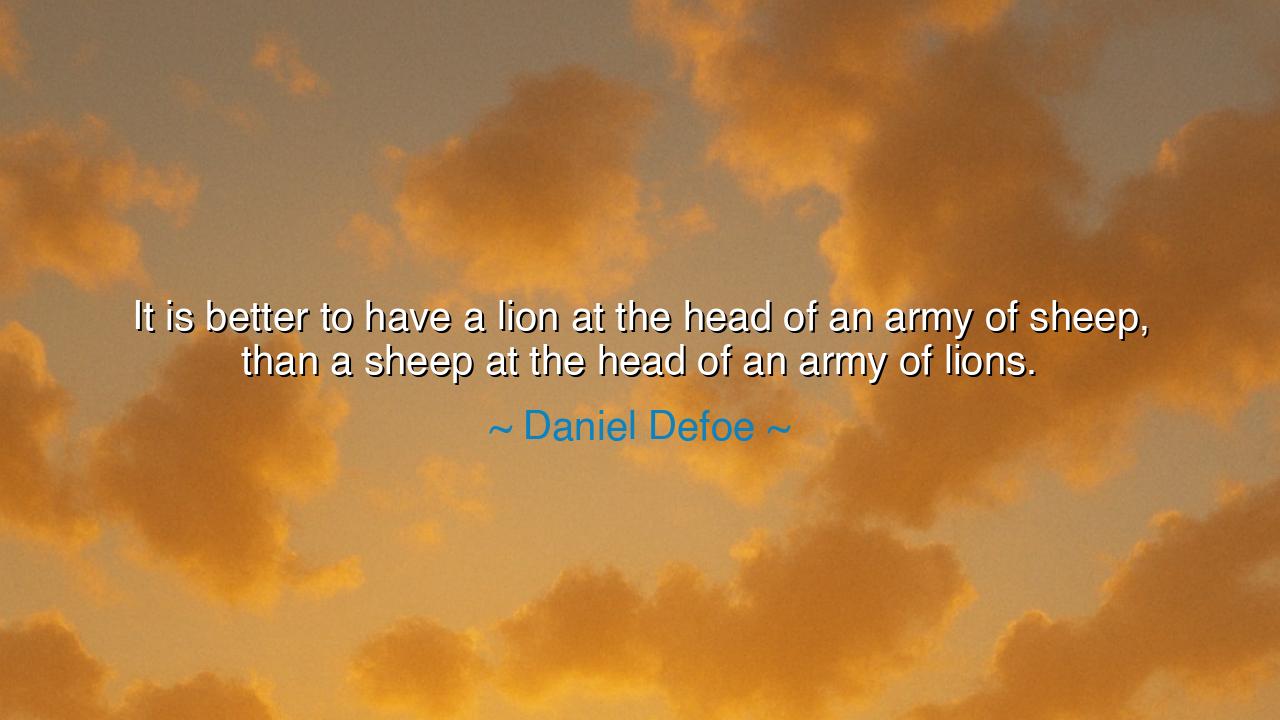
It is better to have a lion at the head of an army of sheep, than
It is better to have a lion at the head of an army of sheep, than a sheep at the head of an army of lions.






“It is better to have a lion at the head of an army of sheep, than a sheep at the head of an army of lions.” Thus wrote Daniel Defoe, the English novelist and thinker, whose words pierce through time like a clarion call to all who would understand the nature of leadership. His insight reveals an eternal truth: that the courage, vision, and strength of the one who leads can transform even the meek into the mighty, while the weakness of a leader can reduce even the powerful to fear and confusion. The lion symbolizes courage, decisiveness, and nobility of spirit; the sheep, timidity and dependence. And so Defoe teaches us that it is not the size or strength of the army that wins the day—it is the spirit of the one who stands at its head.
To have a lion at the head of an army of sheep is to see the miracle of transformation that true leadership can bring. The lion does not tremble before the enemy, nor hesitate before the challenge. His roar awakens courage where there was none; his stride commands confidence where there was doubt. Under such a leader, even the weakest find their strength, for courage is contagious. The lion inspires his followers not to see themselves as sheep, but as lions in disguise. He leads not by words alone, but by the living power of example. The lion’s bravery becomes the blood in their veins, and his strength their shield.
But woe to the army of lions led by a sheep, for though they possess power, they lack direction; though they have might, they have no will. A sheep as a leader is one who hesitates when he should advance, who doubts when he should decide, who seeks safety where he should seek victory. Such a leader drains the strength of his people, for fear and indecision are more deadly than any sword. The lions, mighty in potential, become paralyzed by the weakness of their shepherd. Their claws dull, their roars fade, and their courage dissolves into confusion. The flock becomes lost, not because it lacked warriors, but because it lacked a leader.
Daniel Defoe, the author of Robinson Crusoe, was a man who understood the power of resolve and self-mastery. Living in an age of upheaval—when nations waged war for power and merchants built empires of trade—he saw that the quality of leadership determined the fate of kingdoms. His words were not born from fantasy, but from the hard truths of life: that a single bold and wise leader can lift a multitude to greatness, while a timid one can drag them all into ruin. In Defoe’s world, as in ours, the lion was not merely a beast—it was a symbol of the indomitable spirit that must dwell in those who dare to lead.
Consider the story of Alexander the Great, who, with an army far smaller than those he faced, conquered vast empires stretching from Greece to India. His soldiers were not always the best equipped, nor the most numerous—but they were inspired by a leader whose courage blazed like fire. His very presence on the battlefield transformed them. He led from the front, sharing their dangers, facing their fears. Where others saw impossible odds, Alexander saw destiny. His army, though mortal, fought like gods, because their lion-hearted leader taught them to believe in victory before the battle had even begun.
Yet there are countless examples of the opposite—a sheep leading lions. History remembers generals who commanded mighty forces but fell to ruin because they lacked courage or conviction. Armies with strength and strategy were undone by leaders who wavered at the moment of truth. Such leaders shrink from responsibility, seek the approval of others before they act, and fear loss more than they desire glory. Their hesitation infects the hearts of their followers, turning valor into doubt. Even lions, under such a shepherd, forget that they were born to roar.
Therefore, O seeker of wisdom, understand this sacred truth: leadership begins within. To lead others, one must first conquer fear in oneself. Be the lion among your people—not through arrogance or domination, but through courage and clarity of purpose. Stand firm when others waver. Speak truth when others fall silent. Let your strength inspire the timid, and your example awaken the dormant courage in those you guide. For leadership is not granted by rank or title—it is earned through the fire of conviction.
The lesson is clear: An army, a family, a company, or a nation will always rise or fall with its leader. If you would lead, lead like a lion—with heart, with vision, and with strength. Inspire your followers to see themselves as more than they believe, and they will achieve more than they imagine. For as Daniel Defoe taught, even a host of sheep, under the command of a lion, can become unstoppable; but an army of lions, led by a sheep, will surely lose its roar. So rise, be brave, and lead—not by fear, but by the fearless spirit that awakens greatness in all who follow you.






AAdministratorAdministrator
Welcome, honored guests. Please leave a comment, we will respond soon